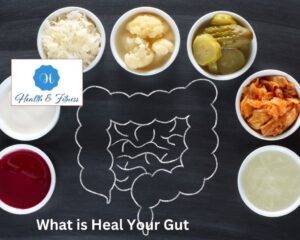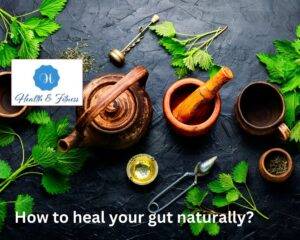How to Heal Your Gut: Empowering Steps to Nurture Your Digestive Health
How to Heal Your Gut: Nurture your digestive health with empowering steps on how to heal your gut. Explore strategies for a healthier, happier you
Introduction to How to Heal Your Gut.
Gut health is a topic that has gained significant attention in recent years, which makes perfect sense. The digestive system, the intestinal lining, and the immune system depend on gut health to function correctly. However, modern lifestyles and dietary habits often lead to an imbalance in our gut microbiome, resulting in various digestive issues. This blog post will explore empowering steps to nurture your digestive health and heal your gut, focusing on innovative and creative approaches beyond the generic advice.
What is Heal Your Gut

Heal Your Gut” refers to restoring and improving digestive system health. It involves strategies like dietary changes, stress management, and incorporating gut-friendly foods. Healing the gut requires addressing imbalances, nourishing beneficial bacteria, and promoting optimal digestion. Each person’s journey is unique, requiring experimentation and professional guidance. Prioritizing gut health leads to improved overall well-being.
We will explore how to heal your gut as follows:
Section 1: The Gut Microbiome – A Delicate Ecosystem
Understanding the gut microbiome and its role in our health is the first step towards nurturing your digestive health. The gut microbiome is a complex ecosystem of trillions of microorganisms, including bacteria, fungi, and viruses, that live in our digestive tract. These microorganisms are essential in breaking down food, synthesizing vitamins, and protecting against harmful pathogens.
Maintaining a diverse and balanced gut flora is essential for optimal health. Factors such as stress, antibiotics, and poor diet can disrupt the delicate balance of the gut microbiome, leading to digestive issues and a weakened immune system. By understanding the importance of a healthy gut microbiome, we can take proactive steps to support and nurture our digestive health.
Section 2: Nourishing Your Gut with Prebiotics and Probiotics
Prebiotics and probiotics are essential components of a gut-friendly diet. Prebiotics are non-digestible fibers found in certain plant-based foods that fuel the beneficial bacteria in our gut. On the other hand, probiotics are live microorganisms that can help restore and maintain a healthy gut microbiome.
Consider incorporating prebiotic-rich foods like artichokes, onions, and asparagus to support your gut health. Get creative with your meal planning by adding these foods to salads, stir-fries, or even blending them into smoothies.
Think beyond yogurt and explore unconventional sources like kimchi, kefir, and kombucha regarding probiotics. These fermented foods provide a rich source of probiotics and add unique flavors and textures to your meals.
Section 3: The Power of Fermented Foods
Various cultures have consumed fermented foods for centuries due to their numerous health benefits. The fermentation process enhances the nutritional value of foods by breaking down complex nutrients into more easily digestible forms. Additionally, fermented foods are rich in beneficial bacteria that can help to support a healthy gut microbiome.
To reap the benefits of fermented foods, consider making your sauerkraut, miso, or tempeh at home. These DIY projects can be fun and rewarding to incorporate gut-friendly foods into your diet. Additionally, get creative with your recipes by adding fermented foods to classic dishes for a gut-friendly twist. For example, try using kimchi in a stir-fry or adding kefir to your morning smoothie.
Section 4: Mindful Eating – Connecting with Your Food
The way we eat can have a significant impact on our digestive health. Mindful eating is a practice that involves paying attention to the sensory experience of eating, as well as our body’s hunger and fullness cues. Eating mindfully improves digestion, reduces overeating, and develops a healthier relationship with food.
To practice mindful eating, try incorporating techniques such as chewing slowly, savoring flavors, and eliminating distractions during meals. Additionally, consider incorporating gratitude and intention-setting into your mealtime routine. By taking the time to appreciate food’s nourishment, we can cultivate a deeper connection with our food and support our digestive health.
Section 5: The Gut-Brain Connection – Managing Stress for Better Digestion
The gut and brain are intricately connected through a complex network of nerves, hormones, and neurotransmitters. This gut-brain connection is crucial in regulating digestion and overall gut health. Stress can significantly impact the gut-brain relationship, leading to gut microbiome disruptions and digestive issues.
To support your gut health, it’s essential to manage stress effectively. Consider incorporating creative stress management techniques like journaling, meditation, and breathwork into your daily routine. These practices can help calm the mind and promote balance, positively impacting your digestive health.
Section 6: Movement and Exercise – A Key Ingredient for Gut Health
Regular exercise is essential for maintaining overall health, and it also plays a crucial role in supporting digestive health. Physical activity can help to improve gut motility, reduce inflammation, and promote the growth of beneficial gut bacteria.
To support your gut health, explore unconventional forms of exercise that promote gut health, such as yoga, tai chi, and rebounding. These low-impact activities can help to stimulate digestion and improve overall gut function. Look for ways to incorporate movement into your daily routine, even with a busy schedule. Simple activities like walking after dinner or stretching during work breaks can positively impact your gut health.
Section 7: Sleep and Gut Health – Restoring Your Digestive System
How to Heal Your Gut?
Sleep is vital in maintaining overall health and is particularly important for gut health. A consistent sleep routine allows the digestive system to rest and repair, promoting optimal gut function. Poor sleep quality can disrupt the gut microbiome and contribute to digestive issues.
Consider incorporating creative strategies such as aromatherapy, sound therapy, and sleep-inducing teas into your bedtime routine to improve sleep quality. Progressive muscular relaxation and guided imagery can also relax the mind and body for sleep.
Section 8: Personalizing Your Gut Health Journey
It’s essential to recognize that gut health is not a one-size-fits-all approach. Each individual’s gut health journey is unique, and it’s necessary to listen to your body and make adjustments based on your specific needs. Personalized nutrition and food sensitivity testing can help to identify potential triggers for digestive issues and guide you towards a more tailored gut health plan.
Working with a healthcare professional or nutritionist can provide valuable insights and support as you navigate your gut health journey. By seeking professional guidance, you can develop a tailored plan that addresses your unique needs and supports your overall well-being.
How to Heal Your Gut Naturally?

Your gut health plays a vital role in your overall well-being. When your gut is out of balance, it can lead to various discomforts and health issues. Rather than relying solely on medication, why not explore natural remedies to heal your gut? This article delves into creative and clever ways to restore gut harmony and promote digestive healing.
1. Cultivate a Rainbow Plate
Nourishing your gut starts with what you put on your plate. Aim for a colorful array of fruits and vegetables to provide essential nutrients, antioxidants, and fibre. Each vibrant hue carries unique health benefits, supporting a diverse gut microbiome and promoting optimal digestion.
2. Harness the Power of Fermentation
Fermented foods are gut-friendly superheroes. Incorporate delicious options like sauerkraut, kimchi, kefir, and kombucha into your diet. These fermented delights are rich in beneficial bacteria, enzymes, and organic acids that support gut health, enhance nutrient absorption and aid digestion.
3. Embrace Herbal Allies
Nature’s Pharmacy offers a wide range of herbs that can promote gut healing. Explore the soothing properties of chamomile, peppermint, ginger, and fennel. These herbs can calm inflammation, ease digestive discomfort, and support healthy digestion. Infuse them in teas or incorporate them into your meals for a flavorful twist.
4. Mindful Eating for Gut Serenity
Slow down and savor your meals with mindful eating practices. Take the time to chew your food thoroughly, savoring each bite. This cautious approach supports optimal digestion by initiating the release of digestive enzymes and promoting nutrient absorption. Additionally, it can reduce stress, often linked to gut imbalances.
5. Get Acquainted with Gut-Healing Superfoods
Certain foods possess extraordinary gut-healing properties. Include various superfoods in your diet to nourish and repair your gut. Consider incorporating bone broth, aloe vera, turmeric, slippery elm, and collagen-rich foods. These powerhouses can reduce inflammation, improve the gut lining, and promote gut integrity.
6. Embrace Stress-Busting Practices
Stress and gut health are closely interconnected. Engage in stress management techniques such as meditation, deep breathing exercises, yoga, or engaging hobbies to promote relaxation. Reducing stress creates a conducive environment for your gut to heal and function optimally.
7. Prioritize Sleep for Gut Renewal
Quality sleep is fundamental to gut healing. Aim for a consistent sleep schedule and create a soothing bedtime routine. Prioritize 7-9 hours of uninterrupted sleep to allow your body and gut to repair, regenerate, and restore balance.
8. Move with Purpose
Regular physical activity supports overall health and aids digestion. Engage in exercises you enjoy, whether brisk walking, cycling, dancing, or yoga. Movement stimulates the digestive system, enhances blood flow, and promotes gut motility.
9. Nurture a Healthy Gut Environment
Maintaining a healthy gut environment is crucial for healing. Avoid excessive use of antibiotics, as they can disrupt the delicate balance of gut bacteria. Instead, opt for natural alternatives when possible. Additionally, reduce exposure to toxins and incorporate gentle detoxifying practices to support your gut’s biological detoxification processes.
Conclusion: Healing your gut naturally is a journey of self-discovery and nourishment. Incorporating these creative and clever strategies into your lifestyle can restore gut harmony, promote digestive healing, and unlock optimal well-being. Embrace these empowering steps and let your gut thrive in vibrant health and vitality.
Conclusion to How to Heal Your Gut
Finally, we wrap up how to heal your gut as Healing your gut and nurturing your digestive health is a multifaceted journey that requires a holistic approach. By incorporating creative and unconventional strategies, such as exploring fermented foods, practicing mindful eating, and managing stress, you can empower yourself to take control of your gut health. Remember that each individual’s gut health journey is unique, and it’s essential to listen to your body and seek professional guidance when necessary. By prioritizing your gut health, you are investing in your overall well-being and laying the foundation for a vibrant, healthy life.
Reference
- National Institute of Diabetes and Digestive and Kidney Diseases. (2021). Eating, Diet, & Nutrition for Irritable Bowel Syndrome. Retrieved from https://www.niddk.nih.gov/health-information/digestive-diseases/irritable-bowel-syndrome/eating-diet-nutrition
- Harvard Health Publishing. (2021). Probiotics may help prevent diarrhea due to antibiotic use. Retrieved from https://www.health.harvard.edu/vitamins-and-supplements/health-benefits-of-taking-probiotics

Adel Galal is a health and wellness writer with over 30 years of experience studying and writing about health, fitness, nutrition, and healthy living. He is the founder of NextFitLife.com, where he shares practical, evidence-based guidance to support long-term health at any age. Adel’s mission is simple:
to help people make smarter health choices that fit real life, at any age.



